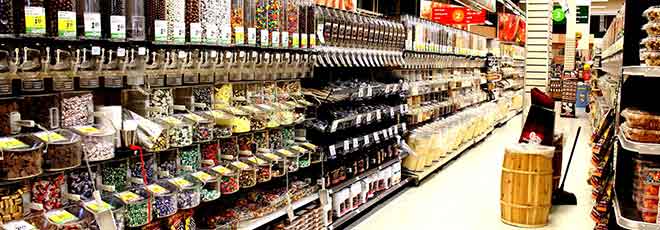
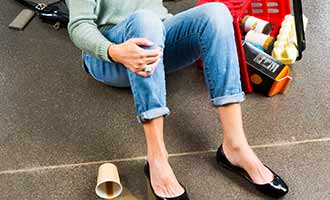 Retail stores provide vital services and goods to the public and also create a large number of jobs with over 21 million people currently working in the retail industry across the county. Retail employees also suffer a high rate of slip, trip, and fall injuries compared to other industries according to the Centers for Disease Control and Prevention (CDC). Slip and fall accidents are the second most common cause of workplace injuries, often requiring medical attention and taking time off from work after they occur. While most slip and fall injuries are relatively minor, resulting injuries can be serious resulting in the need for ongoing or intensive medical care. The Occupational Health and Safety Administration (OSHA) reports that employers who implement simple injury prevention policies report fewer injuries in the workplace and fewer Rhode Island Worker’s Compensation lawsuits.
Retail stores provide vital services and goods to the public and also create a large number of jobs with over 21 million people currently working in the retail industry across the county. Retail employees also suffer a high rate of slip, trip, and fall injuries compared to other industries according to the Centers for Disease Control and Prevention (CDC). Slip and fall accidents are the second most common cause of workplace injuries, often requiring medical attention and taking time off from work after they occur. While most slip and fall injuries are relatively minor, resulting injuries can be serious resulting in the need for ongoing or intensive medical care. The Occupational Health and Safety Administration (OSHA) reports that employers who implement simple injury prevention policies report fewer injuries in the workplace and fewer Rhode Island Worker’s Compensation lawsuits.
Why are Slip and Fall Accidents Common in the Retail Industry?
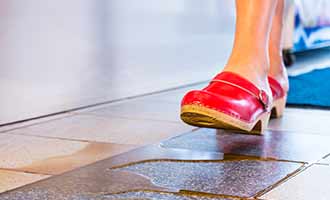 According to the CDC, approximately 75% of slip and fall injuries occur due to low friction between the shoe and walking surface or an employee’s foot coming into contact with an uneven or wet surface. Because most retail employees are on their feet during their shift and often required to repeatedly lift and carry items, this puts them at a higher risk for slips and trips resulting in falls. Grocery store and restaurant employees are most at risk due to the presence of liquids and various foods that can easily end up on the floor and cause wet, slippery surfaces. Other factors such as loose floor mats or uneven carpeting and poor lighting can also play a significant role in the high level of risk for falls in the retail industry.
According to the CDC, approximately 75% of slip and fall injuries occur due to low friction between the shoe and walking surface or an employee’s foot coming into contact with an uneven or wet surface. Because most retail employees are on their feet during their shift and often required to repeatedly lift and carry items, this puts them at a higher risk for slips and trips resulting in falls. Grocery store and restaurant employees are most at risk due to the presence of liquids and various foods that can easily end up on the floor and cause wet, slippery surfaces. Other factors such as loose floor mats or uneven carpeting and poor lighting can also play a significant role in the high level of risk for falls in the retail industry.
What are Common Injuries Caused by Slip and Fall Accidents?
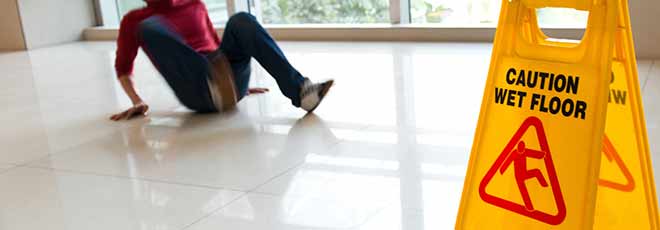
Most slip and fall accidents lead to only minor injuries with employees making a full recovery. However, these accidents can cause serious injury leading to expensive medical bills and lost time at work. Some of the most common injuries associated with these accidents include:
- Back injuries
- Muscle strains/sprains
- Broken/fractured bones
- Concussions
- Traumatic brain injuries
- Paralysis
- Lacerations
- Scrapes and contusions
- Nerve injuries/numbness
- Even death
What Can Employers Do to Make the Workplace Safe?
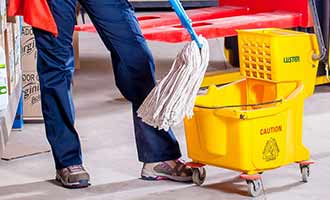 The CDC recommends that employers ensure that all employees are properly trained on the dangers of slip and fall accidents and how to avoid them. It is also recommended that employers require employees to wear proper footwear with grips on the soles to avoid falls. Other steps employers can take to minimize the risk of falls includes the following:
The CDC recommends that employers ensure that all employees are properly trained on the dangers of slip and fall accidents and how to avoid them. It is also recommended that employers require employees to wear proper footwear with grips on the soles to avoid falls. Other steps employers can take to minimize the risk of falls includes the following:
- Clean floors as soon as they become wet or slippery
- Place warning signs in any areas that are wet or slippery
- Ensure floor mats and carpeting is installed correctly
- Clear passageways of clutter and debris
- Install handrails where needed and appropriate
- Make sure lighting is adequate in all work and service areas
- Routinely inspect work areas to make sure they are safe
Contact and Experienced Rhode Island Workers’ Compensation Lawyer
 If you or someone you know has been injured while at work in Rhode Island, contact one of our experienced Rhode Island Worker’s Compensation lawyers. You may be entitled to collect for workers compensation benefits for lost wages, medical bills and possibly a lump sum settlement, among other benefits. No fees are received unless you win your case. For a free (no obligation) case evaluation, call us toll free at 1-800-992-6878. You may also fill out our contact form online.
If you or someone you know has been injured while at work in Rhode Island, contact one of our experienced Rhode Island Worker’s Compensation lawyers. You may be entitled to collect for workers compensation benefits for lost wages, medical bills and possibly a lump sum settlement, among other benefits. No fees are received unless you win your case. For a free (no obligation) case evaluation, call us toll free at 1-800-992-6878. You may also fill out our contact form online.
Sources:


